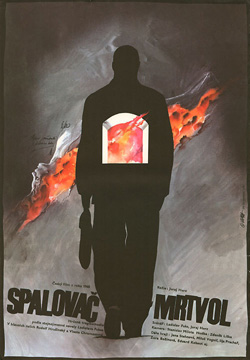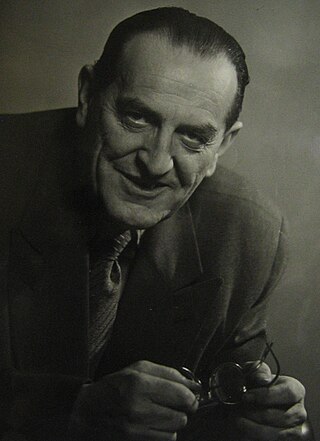
Olšany Cemeteries is the largest graveyard in Prague, Czech Republic, once laid out for as many as two million burials. The graveyard is particularly noted for its many remarkable art nouveau monuments.

Viktor Dyk was a nationalist Czech poet, prose writer, playwright, politician and political writer. He was sent to jail during the First World War for opposing the Austro-Hungarian empire. He was one of the signatories of the Manifesto of Czech writers. Dyk co-founded a political party and entered politics. He died at age 53, leaving his many poems, plays and writings.

Pavel Kohout is a Czech and Austrian novelist, playwright, and poet. He was a member of the Communist Party of Czechoslovakia, a Prague Spring participant and dissident in the 1970s until he was not allowed to return from Austria. He was a founding member of the Charter 77 movement.

Vlastimil Kopecký was a Czech football player. He played 26 games for Czechoslovakia, scoring eight goals. He was a participant in the 1934 and 1938 FIFA World Cups.

Český národně socialistický tábor — Vlajka was a small Czech fascist, antisemitic and nationalist movement. Vlajka's eponymous newspaper was founded in 1928, its first editor being Miloš Maixner. During the time of German occupation, the organisation collaborated with the Nazis for which it was banned and its members were punished after the liberation.

The Cassandra Cat, also released under the titles When the Cat Comes, The Cat Who Wore Sunglasses, One Day a Cat and/or That Cat, is a 1963 Czechoslovak film directed by Vojtěch Jasný.

Sekal Has to Die is a 1998 Czech film directed by Vladimír Michálek. It was the Czech Republic's submission to the 71st Academy Awards for the Academy Award for Best Foreign Language Film, but was not accepted as a nominee.

Iva Janžurová is a Czech actress. She attended school in České Budějovice and in 1963, she graduated from the Faculty of Theatre at the Academy of Performing Arts in Prague. In 1964, she became the main member of Vinohrady Theatre and since 1988 has been a member of the National Theatre in Prague. She has appeared in many films, such as Což takhle dát si špenát, Marecek, Pass Me the Pen!, and the television series Hospital at the End of the City. In 1998 and 2002, she was awarded the Czech Lion for Best Actress.
The Trap is a 1950 Czech drama film directed by Martin Frič. It was entered into the 1951 Cannes Film Festival.

The Cremator is a 1969 Czechoslovak dark comedy horror film directed by Juraj Herz, based on a novel by Ladislav Fuks. The screenplay was written by Herz and Fuks. The film was selected as the Czechoslovakian entry for the Best Foreign Language Film at the 42nd Academy Awards, but was not accepted as a nominee. In 1972, it won the Festival de Cine de Sitges Best Film award, where it also received awards for its star Rudolf Hrušínský and cinematographer Stanislav Milota.
Lucerna is a Czech fairy-tale play based on a theme of writer Alois Jirásek. The stage play Lucerna, in four acts, was written by Alois Jirásek in 1905. It premiered on 17 November 1905 in National Theatre in Prague. The play was a best-seller.

Adelheid is a 1970 Czechoslovak drama film directed by František Vláčil, based on a 1967 novel of the same name by Czech writer Vladimír Körner. The story is about the complicated relationship between Czech man Viktor and German woman Adelheid, and about relationships between Czechs and Germans in postwar Czechoslovakia in general.

Jiřina Štěpničková was a Czech actress. She spent 10 years in prison for an attempt to illegally cross a border.
The Secret of Blood is a 1953 Czechoslovak biographical drama film directed by Martin Frič about Czech doctor Jan Janský who discovered and classified the four different blood types. It competed at 14th Venice International Film Festival.

Vlasta Chramostová was a Czech film actress. She appeared in 35 films since 1950. She starred in the 1950 film The Trap which was entered into the 1951 Cannes Film Festival.

Jiřina Švorcová was a Czech actress and pro-Communist activist. Her acting career lasted more than forty years, but she largely retired after the 1989 Velvet Revolution and devoted herself to advocacy of the Communist Party.

Leaving is a 2011 Czech drama film written and directed by Václav Havel, based on his play of the same name, an absurdist look at the life of an ex-politician. The film received two Czech Lion awards.

Martin Stropnický is a Czech politician and diplomat who served as the minister of Foreign Affairs from December 2017 to June 2018, and was previously minister of Defence from 2014 to 2017. From 2 January 1998 to 22 July 1998 he also served as the minister of Culture. Before entering politics, he was an actor, songwriter, author and director.

Karolina Slunéčková,, working under the name Olga Sluníčková, was a Czech actress, and wife of actor Rudolf Vodrážka.

František Salzer was a Czechoslovak Theatre Director, Theatre Actor, Film Actor, University Professor and Translator.


















